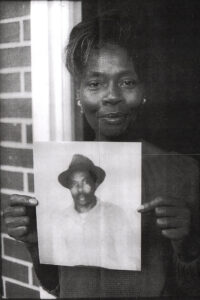2017 Honoree
(1907 – 1967)

Blues historians consider Dan Pickett a classic rambler in the best of the blues tradition. Ray Templeton, a writer for Blues & Rhythm magazine, explains that there was a small group of obscure, solo down-home bluesmen who continued making acoustic country-blues recordings around World War II. This is significant, given that at the time electric, commercial “Chicago style” blues was eclipsing the acoustic sound. Templeton states: “One of the best of these unknowns (if not the best) was Dan Pickett.”
Born in the heart of the Wiregrass region in Pike County, Alabama in 1907, Dan Pickett’s real name was James Founty. He grew up learning the songs of East Coast blues greats like Blind Boy Fuller, Buddy Moss, and Robert Johnson. Blues scholars believe that Pickett did not write much original music, but interpreted classic blues songs in his own unique style. Pickett demonstrated superb proficiency with slide and bottleneck guitar, and another country bluesman, J.W. Warren, reported that at times Pickett kept a tin pan affixed to his guitar. This modification gave his playing a percussive effect, as heard on songs like “Ride to a Funeral in a V8.” Pickett also played harmonica. However, no known recording captured his harmonica work.
Pickett recorded five records with Gotham Records in Philadelphia in 1949. Not one of the records enjoyed widespread popularity, yet he was a favorite of blues collectors due to his obscure status and his excellent guitar playing. Pickett’s vocal delivery also immediately drew the listener in. He sang quickly, syllable on top of syllable, a precursor to late twentieth century rap music.
In 1993, Axel Küstner, notable German blues photographer and historian, travelled to Alabama to unearth more about the Dan Pickett/James Founty story. According to Küstner, Pickett’s family remembered him mostly as travelling from place to place as many other Southeastern blues men had done. His brother, Grover, told Küstner about Pickett’s references to travel by freight trains one morning back in the twenties: “That had to be in 1928 or 9. And he played that guitar all that morning. And the last thing I heard him play that morning – ‘Freight Train Blues.’ He made a record of that….He did leave on a freight train. Same day—that evening.”
Investigating Pickett’s life, Küstner met Pickett’s last wife, Betty Jean Founty, who gave him the only known photo of Pickett. Towards the end of Pickett’s life, he worked for wealthy whites in Boaz, AL, and when he died in 1967, his niece reported that many whites attended the funeral. His appeal to diverse groups challenged the social norms governing race relations during the Civil Rights era in the Deep South, yet Pickett was well-liked by many. He is buried in Albertville, Alabama.
Küstner describes his research on Pickett as being “guided by a superior force” as he encountered incredible luck wherever he went. While walking down the street in Geneva, AL, he came across a group of older black men playing checkers. One man told him that Pickett’s daughter worked at a gas station on the same street. Pickett’s daughter, Jacquelyn, was working the counter when Küstner walked in. When he started playing Pickett’s recordings on a tape recorder, Jacquelyn started to cry. She had not heard or seen her father since 1955. Küstner was the one to tell her of his death and provide her a copy of the only remaining photo of him. Yet, Pickett’s memory lives on today as one of the best examples of a country blues style that originated in Alabama. His captivating version of “99 ½ Won’t Do,” a mixture of soulful blues and gospel, was selected for the 2010 prestigious Oxford American Southern Music Anthology.


